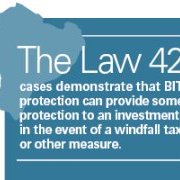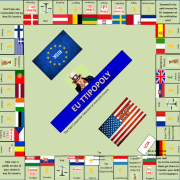investor-state disputes | ISDS
Investor-state dispute settlement (ISDS) refers to a way of handling conflicts under international investment agreements whereby companies from one party are allowed to sue the government of another party. This means they can file a complaint and seek compensation for damages. Many BITs and investment chapters of FTAs allow for this if the investor’s expectation of a profit has been negatively affected by some action that the host government took, such as changing a policy. The dispute is normally handled not in a public court but through a private abritration panel. The usual venues where these proceedings take place are the International Centre for Settlement of Investment Disputes (World Bank), the International Chamber of Commerce, the United Nations Commission on International Trade Law or the International Court of Justice.
ISDS is a hot topic right now because it is being challenged very strongly by concerned citizens in the context of the EU-US TTIP negotiations, the TransPacific Partnership talks and the CETA deal between Canada and the EU.
13-Feb-2015
Scoop
This week’s edition of world-leading medical journal The Lancet includes a call by 27 health experts from New Zealand, Australia, Canada, Chile, Malaysia, the USA, and Vietnam for the TPPA to be made public so its overall health impacts can be assessed.
13-Feb-2015
Stop TTIP
A report authored by Prof. Dr. Siegfried Broß and recently published by the German Hans Böckler Stiftung concludes that the Investor-State-Dispute Settlement (ISDS) tribunals currently planned to be included in the TTIP and CETA free-trade agreements are not in accordance with Germany’s constitution.
9-Feb-2015
JD Supra
Three recent ICSID decisions involving Ecuador highlight the importance of language addressing the status of taxes in investment treaties.
6-Feb-2015
Columbia Center on Sustainable Investment
Advocates of a transatlantic investment treaty should be careful not to overstate their case and play the “China-card” as a core argument for allowing US investors to side-track EU courts.
6-Feb-2015
EurActiv
The French Senate united on Tuesday (3 February) in its opposition to the Investor-State Dispute Settlement mechanism (ISDS).
5-Feb-2015
FT
It is very difficult to refute the general allegation that the TTIP agenda is driven by big business interests, writes John Kay
27-Jan-2015
EurActiv
Trade negotiations between the EU and Canada concluded in October 2013, but France and Germany now want to make changes to the CETA agreement’s investor-state dispute settlement (ISDS) clause.
26-Jan-2015
Mediate.com
There is a developing consensus among states that it is acceptable, and even virtuous, to challenge investor-state arbitration as an infringement on the rights of the public to pass laws through their democratically-elected representatives.
26-Jan-2015
SSRN
This article analyzes the restrictive approach adopted by investor-State arbitration tribunals to human rights arguments raised by host States, as exemplified in the case of the human right to water
25-Jan-2015
CCSI
In 2014, the US again emerged the winner in investor-state arbitration. But it did suffer losses on a number of important issues, and those losses leave it more vulnerable to future claims, litigation costs, and potential liability.
25-Jan-2015
Techdirt
Even if CETA is rejected in Europe, claims under the ISDS chapter would still be possible up to three years afterwards for investments made during the provisional period.
23-Jan-2015
Amazon Watch
Oil giant wins "lifetime achievement" award for efforts to evade justice
22-Jan-2015
Reuters
Cigarette sales have dropped in Australia since plain packaging was introduced on Dec. 1, 2012, prompting Britain to act before its national election in May even as Australia battles international legal challenges from other countries and manufacturers.
21-Jan-2015
Beyond Brics
Instead of relying only on a treaty-based approach, India should initiate domestic policy reforms to attract and protect foreign investments, argues Kavaljit Singh
21-Jan-2015
The Ethiopia Observatory (TEO)
If TTIP is bad, the UK-Ethiopia BIT is worse, says Lorenzo Cotula of IIED
20-Jan-2015
TNI
This brief analyses and illustrates how international investment rules thwart the struggle for land and food sovereignty.
19-Jan-2015
Reuters
Harvest Natural Resources Inc, a Texas based oil and gas company, said on Friday it has filed an arbitration request against Venezuela before a World Bank tribunal to protect the value of its investment in the South American country.
19-Jan-2015
The Parliament Magazine
"ISDS cannot be reformed and, like many archaic trade practices of the 18th century, should be consigned to the annals of history," argues Cecile Toubeau
15-Jan-2015
EurActiv
The two countries are discussing throwing their combined weight behind a common position to exclude an Investor State Dispute Settlement mechanism from trade talks with the US
14-Jan-2015
Toronto Star
Study charts foreign corporations’ growing use of NAFTA’s investor protections to sue governments over environmental and economic regulations





















